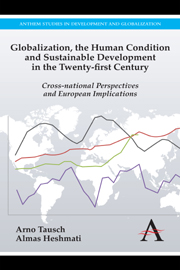 Globalization, the Human Condition and Sustainable Development in the Twenty-First Century
Globalization, the Human Condition and Sustainable Development in the Twenty-First Century Book contents
- Frontmatter
- Contents
- Miscellaneous frontmatter
- List of Abbreviations
- Glossary of Key Terms
- Foreword
- Preface
- 1 Should the Musicians Continue to Play?
- 2 Background
- 3 Methods
- 4 Cross-national Results: Beyond the Pro-globalist Development Approach of the European Commission
- 5 Final Cross-national Results for the Combined Development Indicator
- 6 A Time Series Perspective on Globalization, Growth and Inequality
- 7 Conclusions
- Appendices
- References
- Index of Persons and Authorships
- Index of Subjects and Countries
6 - A Time Series Perspective on Globalization, Growth and Inequality
Published online by Cambridge University Press: 05 July 2012
- Frontmatter
- Contents
- Miscellaneous frontmatter
- List of Abbreviations
- Glossary of Key Terms
- Foreword
- Preface
- 1 Should the Musicians Continue to Play?
- 2 Background
- 3 Methods
- 4 Cross-national Results: Beyond the Pro-globalist Development Approach of the European Commission
- 5 Final Cross-national Results for the Combined Development Indicator
- 6 A Time Series Perspective on Globalization, Growth and Inequality
- 7 Conclusions
- Appendices
- References
- Index of Persons and Authorships
- Index of Subjects and Countries
Summary
In the present chapter, we leave the somewhat trodden paths of macro-quantitative cross-national development research, and we will venture into the new terrain of time series analysis. New terrain, only insofar as this is an established discipline of economics, especially econometrics, but is rather absent from all the studies claiming to show the pros and cons of globalization for economic growth and social and ecological well-being. Time series analysis of globalization and its impacts is important but neglected in the existing literature on globalization.
In the theoretical chapters above we already highlighted the fact there is a recurring interest in the social sciences to study the long-term swings of global capitalist development. Such studies will be forever linked to the name of Nikolai Kondratiev. The questions, arising out of such research in our context are two-fold. One is the not only academic, but also politically highly relevant and value-charged question, whether there is now, after the global recession, hope for a recovery (‘light at the end of the tunnel’), or, as the cruel joke now going around has it, these are just the ‘headlamps of an approaching train’ we see in the tunnel and thus, there is no recovery in sight. The second question, potentially as alarming as the first, is whether globalization-driven economic cycles in earlier periods and today exhibit the same downward patterns and whether or not they are therefore to be associated with rising global world political tensions – instead of leading the world to the promised lands of prosperity and growth will they result in stagnation and global warfare?
- Type
- Chapter
- Information
- Globalization, the Human Condition and Sustainable Development in the Twenty-First CenturyCross-National Perspectives and European Implications, pp. 139 - 154Publisher: Anthem PressPrint publication year: 2012
